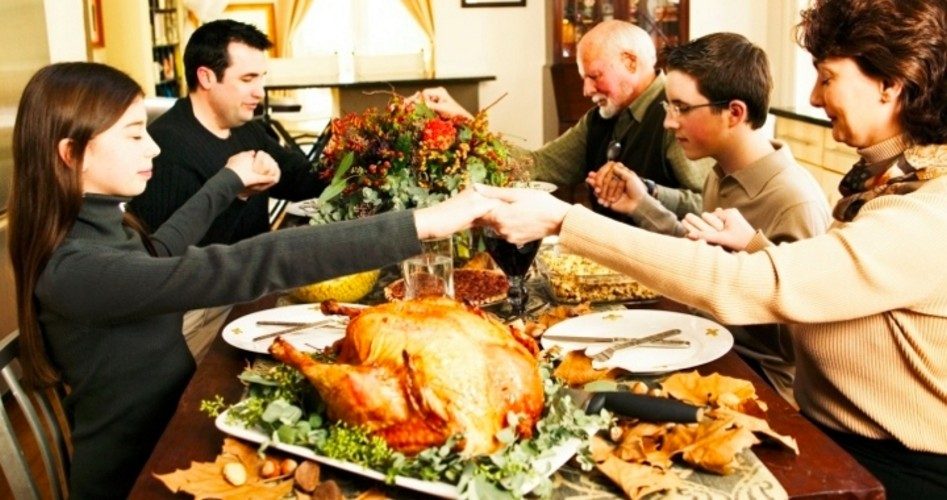
The holiday we celebrate now has its roots in Massachusetts Governor William Bradford’s proclamation of the first Thanksgiving Day on November 29, 1623. He ordered a public ceremony to “render thanksgiving to ye Almighty God for all His blessings.” However, that was not the first thanksgiving on our nation’s soil. Long before, on September 8, 1565, Spanish explorers celebrated Mass in gratitude for their safe arrival at what is now St. Augustine, Florida. Another Mass of thanksgiving was celebrated by Spanish explorers in present-day Texas on April 30, 1598. The first official Thanksgiving ceremony in the American colonies was December 4, 1619, when English settlers arrived at the Berkeley Hundred settlement in Virginia. So Bradford was only following honorable suit.
The infant nation continued the practice. Thomas Jefferson introduced a resolution in the Virginia Assembly in 1774 calling for a Day of Fasting and Prayer, as did Richard Henry Lee in 1777. The governor of New Hampshire, John Langdon, proclaimed official days of thanksgiving, fasting, and prayer in 1785 and 1786. Massachusetts Governor John Hancock issued A Proclamation for a Day of Thanksgiving on November 8, 1783, to celebrate victory of the colonies in the Revolutionary War because, “the Interposition of Divine Providence in our Favor hath been most abundantly and most graciously manifested, and the Citizens of these United States have every Reason for Praise and Gratitude to the God of their salvation.”
Congress also acted nobly in those days. The Continental Congress issued the First National Proclamation of Thanksgiving to all colonies to thank God for victory at Saratoga during the Revolutionary War. It established Thursday, December 18, 1777 as a day of “solemn thanksgiving and praise,” to show gratitude to Almighty God, reminding Americans that “it is the indispensable duty of all men to adore the superintending Providence of Almighty God [and] to acknowledge with gratitude their obligation to Him for benefits received.” The proclamation called upon citizens to “consecrate themselves to the service of their Divine Benefactor” and to confess their “manifold sins” and beg God to “mercifully forgive and blot them out of remembrance.” It also asked God’s continued blessings and recommended that everyone abstain from servile labor, as would be “unbecoming … on so solemn an occasion.” Three years later, on October 18, 1780, the Continental Congress issued a similar proclamation after Benedict Arnold’s traitorous plans were exposed.
Congress unanimously approved yet another National Day of Thanksgiving on September 25, 1789, calling for public prayer. President George Washington also signed a “National Thanksgiving Proclamation” on January 1, 1795, pointing to, “Our duty as a people, with devout reverence and affectionate gratitude, to acknowledge our many and great obligations to Almighty God, and implore Him to continue and confirm the blessings we experienced.”
Thanksgiving Day was officially set on the last Thursday of November in 1863 when Congress passed an act signed by President Abraham Lincoln, who said, “[It is] announced in Holy Scripture and proven by all history, that those nations are blessed whose God is the Lord… It has seemed to me fit and proper that God should be solemnly, reverently and gratefully acknowledged, as with one heart and one voice, by the whole American people.”
By 1939, times had changed. Thanksgiving was no longer about giving thanks but about ringing in the Christmas shopping season. Retailers pressured President Franklin Delano Roosevelt to change Thanksgiving from the last Thursday of November (which fell on November 30 that year) to the fourth Thursday so they could have an extra week to peddle their Christmas wares. He did so to the confusion of many, since calendars, and school and vacation schedules, were already set according to tradition. About half of the country celebrated one week before the other half, while Texas and Colorado celebrated both dates. The next year was just as confusing, so Congress stepped in to clear things up. It approved a 1941 joint resolution that Thanksgiving Day would always be observed on the fourth Thursday of November. The resolution became law in 1977 (Public Law 77-379), declaring “the fourth Thursday of every November: A National Day of Thanksgiving.” What a pitiful contrast to the inspiring tributes made by our founders in regard to what should be a God-centered holiday.
The tombstone of Governor William Bradford is inscribed in Latin: “What our fathers with so much difficulty attained do not basely relinquish.” That is sound advice! We should not basely relinquish our Christian heritage to materialism or to the modern idea that a nation belongs to the people who live here now rather than those who helped build her. On this Thanksgiving Day, as we thank God for our great nation, let us beg Him to convert our leaders into models of those godly statesmen of yore.
This New American article was originally published on Nov. 26, 2009. Sources used by the author: Federer, William J., America’s God and Country: Encyclopedia of Quotations, Amerisearch, Inc. 1999; Walls, Lt. Col. Timothy. “Giving Thanks is Tradition that Began with Pioneers,” Hawaii Army Weekly, December 5, 2008.
Related articles:
The Pilgrims Weren’t Socialists




